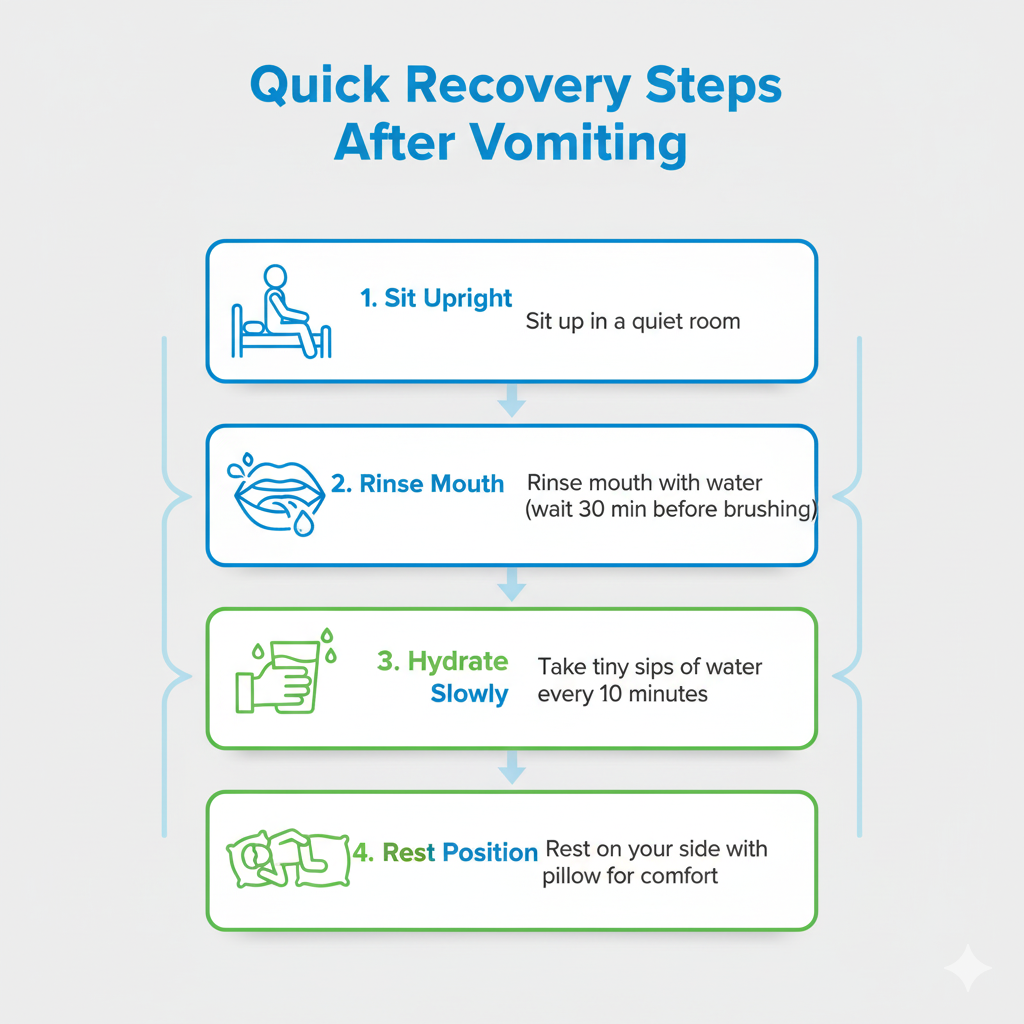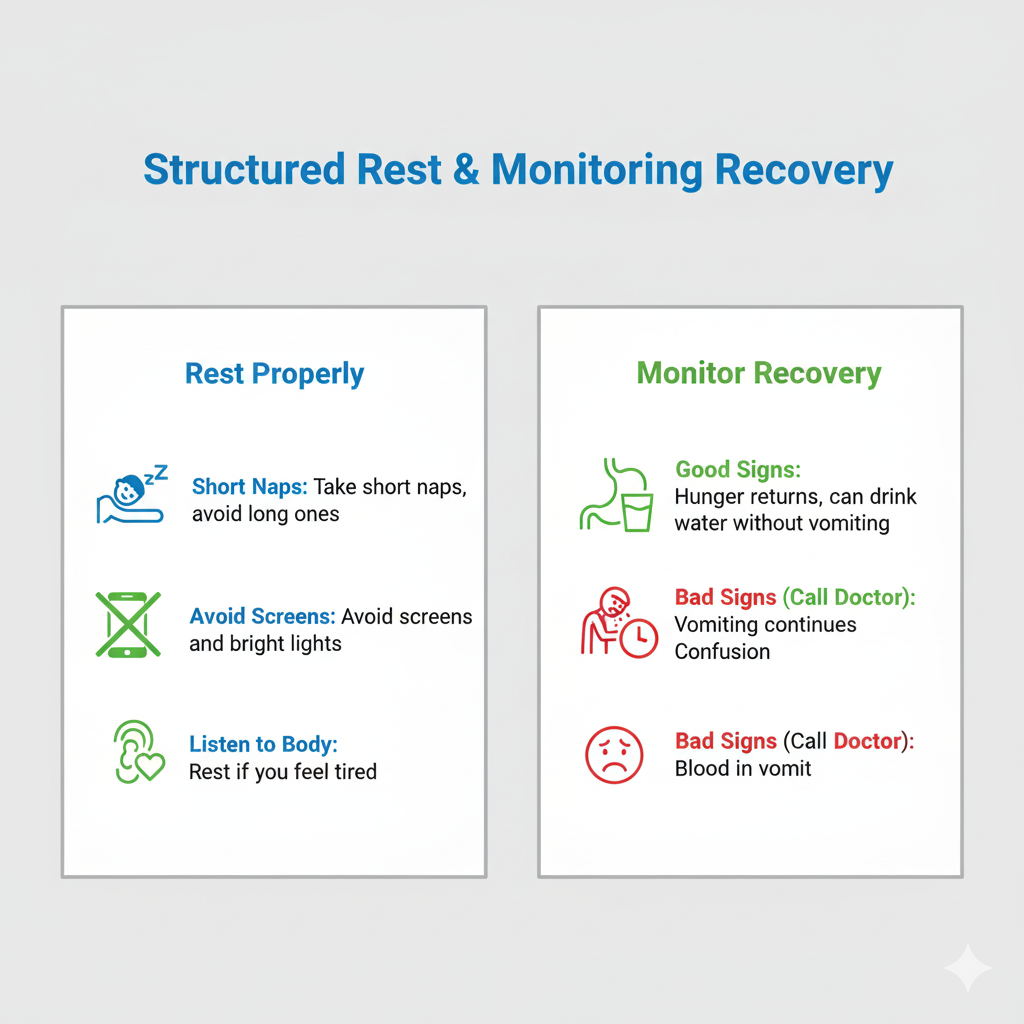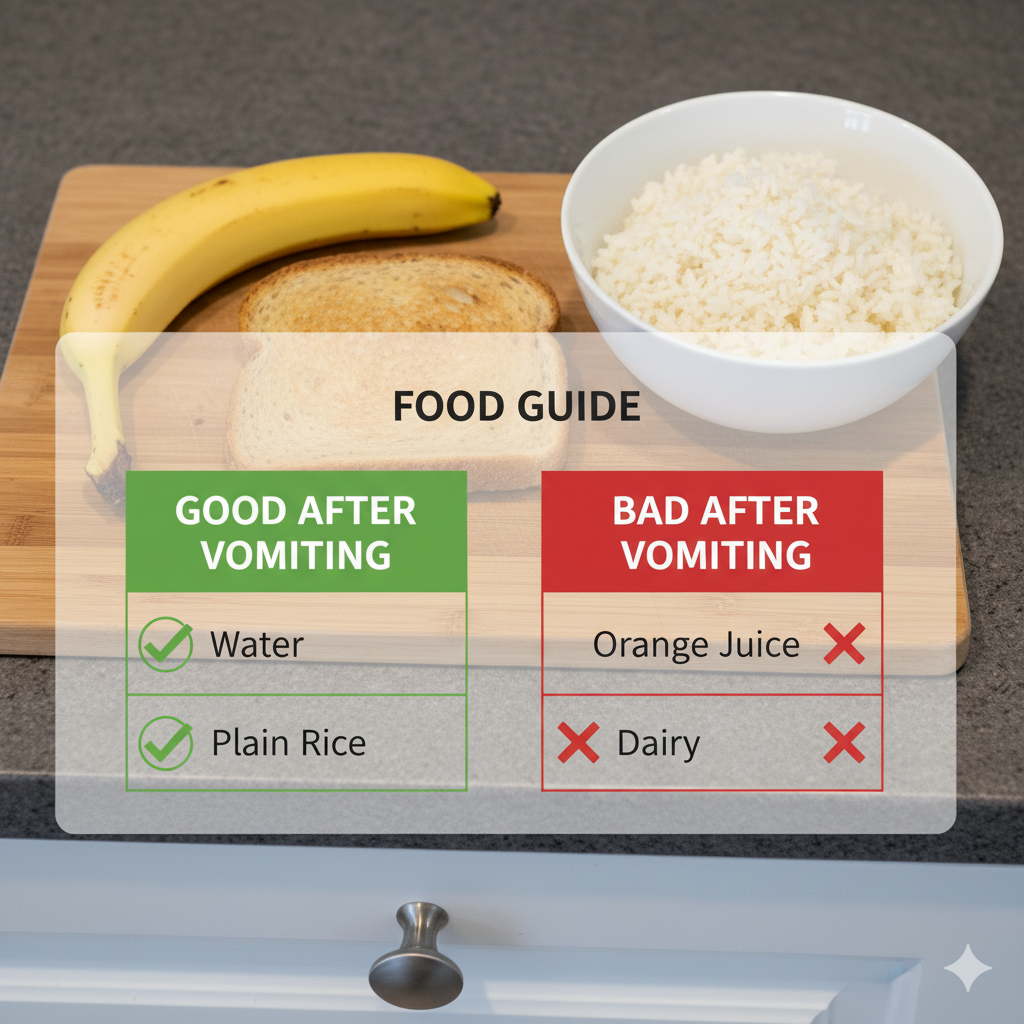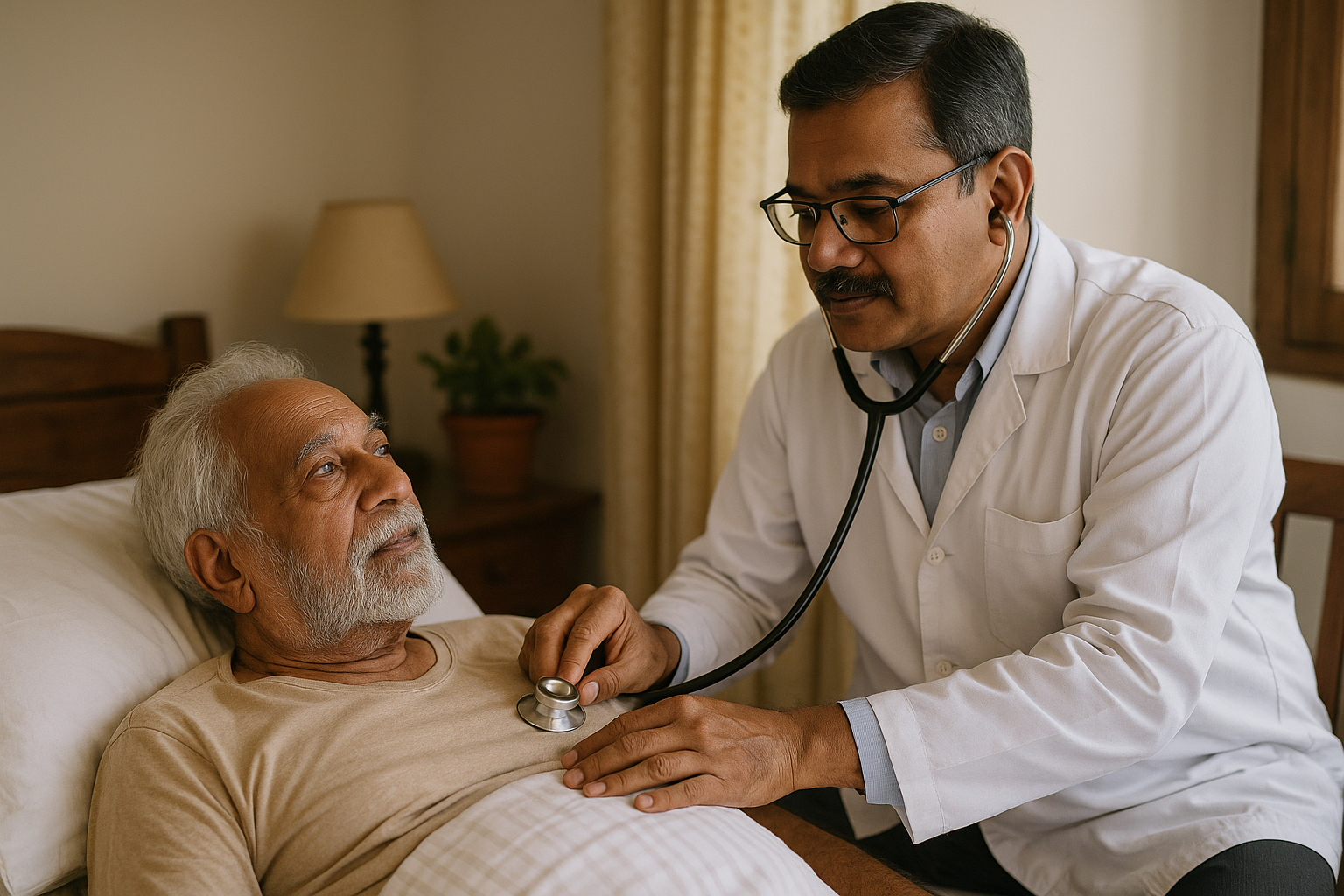Feeling sick can make the whole day harder. If you have just finished vomiting, weakness often follows. Getting better at home is possible if you take small, careful steps. Dr. Morepen Home understands your need for clear advice and trustworthy care. This guide uses easy words, short paragraphs, and examples to show what to do next.
Quick Recovery Steps After Vomiting
What to Do Immediately Post-Vomiting
After vomiting stops, sit up in a quiet room. Staying upright helps your body recover and keeps food from coming back up. Rinse your mouth with water to clear away any acid. Use a soft cloth on your neck or forehead if you feel hot. Make sure the room is calm and not too bright.

Essential Hydration Strategies
Take tiny sips of water every ten minutes. Avoid drinking too much at once. If you feel okay, try more water later. Small drinks help your body heal without upsetting your stomach.
Oral Care After Vomiting (Protecting Teeth)
Wait at least half an hour before brushing your teeth. Rinse with water instead. This step keeps your teeth safe from acid that can harm them if brushed right away.
Initial Rest and Positioning Advice
Rest in a cool room. Try lying on your left side with a pillow for comfort. Sleeping well helps your body recover faster. Listen to soft music or read something light if you don’t want to sleep.
Structured Rest & Monitoring Recovery
How to Rest Properly for Faster Recovery
Take short naps during the day. Long naps can make you feel dizzy. If you feel tired, stop and rest. Avoid screens and bright lights.
Signs You’re Recovering vs. Complications
When hungry feelings come back and you can drink water without vomiting, you are getting better. If vomiting continues, you feel confused, or see blood, call a doctor right away.

Avoiding Activities That Can Delay Healing
Keep activities easy on your body. Skip sports, chores, or heavy lifting. Move slow when you stand or walk to keep nausea away.
Tracking Hydration and Energy Levels
Count your water cups during the day. Pale urine is a good sign of hydration. If you feel tired or weak for many hours, rest until energy returns.
Rehydration: Fluids and Electrolytes
When and How to Start Drinking Again
Wait 30 minutes after vomiting before drinking water. Start slow with teaspoons of water. Add more as you feel better.
Homemade Oral Rehydration Solutions (ORS)
Mix 1 liter of water, 6 teaspoons sugar, and half a teaspoon of salt for a simple drink. This puts electrolytes back in your body.
Electrolyte-Rich Fluid Options
Good choices include coconut water, apple juice mixed with water, and clear soup. Sports drinks can help if they do not have strong flavors or sweeteners.
What Fluids to Avoid Post-Vomiting
Skip fizzy drinks, coffee, and juice with acid. Cold drinks or ones with sugar can upset your stomach more.
Gentle Diet Progression: BRAT and Beyond

First 6 Hours: What NOT to Eat
In the first few hours, avoid all foods. Only clear liquids are okay. Even crackers or bread may be too rough for your stomach at first.
The BRAT Diet: What Works and When to Progress
Banana, rice, applesauce, and toast are gentle foods. Start with small bites. If stomach stays calm, slowly add a little more.
Transitioning from Clear Liquids to Bland Foods
Add in plain boiled potatoes or dry biscuits after liquids. Boiled carrots can help too. No fried foods or spicy items until your stomach is strong.
Sample Meal Timeline (Day 1, Day 2, Day 3)
- Day 1: Water, ORS, broth, and BRAT foods in tiny amounts.
- Day 2: Try boiled veggies, plain toast, and clear homemade soup.
- Day 3: Soft grains and tender proteins, like eggs or paneer.
When to Resume Regular Foods Safely
Return to your normal meals only after you can eat without feeling sick. If your stomach hurts again, switch back to bland foods.
Best Foods for Strength and Energy
Top Recovery Foods (Bananas, Toast, Crackers)
Bananas give potassium. Toast and crackers are simple and easy to chew. Applesauce is smooth and gentle on your stomach.
Gentle Proteins and Easy-to-Digest Vegetables
Start with plain eggs, skinless chicken, soft cheese, or plain yogurt. Steamed carrots and potatoes add vitamins without making your stomach work too hard.

Foods That Help Restore Lost Vitamins/Minerals
- Potassium: banana, coconut water
- Magnesium: cooked spinach, oats
- Vitamin C: steamed broccoli, applesauce
Foods and Ingredients to Avoid
Don’t eat spicy, fatty, or fried foods, citrus fruits, or rich desserts. Raw peppers and onions can upset your stomach more.
Natural and Medicinal Relief for Ongoing Nausea
Ginger, Peppermint, Aromatherapy: Evidence & Use
Ginger tea can calm nausea. Peppermint candies help some people. Use gentle scents like lemon or peppermint to relax but only if you find them pleasant.
OTC Remedies and When to Choose Medication
Simple medicines may help if nausea will not go away. Always ask a doctor before using medicines, especially for kids, older people, or those who are pregnant.
Deep Breathing & Wrist Acupressure Techniques
Try slow deep breaths to relax your stomach. Pressing three fingers below your wrist can make nausea feel less strong.
When Home Remedies May Not Be Enough
Call a doctor if nausea or weakness lasts more than two days, or if you feel dizzy, confused, or see blood.
Special Cases: Children, Elderly, Pregnant People
Adjusting Diet and Rest Strategies
Give children small sips of fluid often. Pregnant people should include high-energy snacks and extra water. Older people need special care to prevent dehydration. Watch for problems and follow safety rules for each group.
Safety Precautions and When to Seek Medical Help
Quick heartbeat, tiredness, or repeated vomiting means you should ask a doctor for help. Dr. Morepen Home’s team can answer questions through their website or contact page.

Preventing Dehydration Risks
Signs of dehydration are dry lips, sunken eyes, and little urine. Keep an ORS solution ready and get medical advice right away if these signs appear.
Conclusion
Recovering from vomiting and weakness at home takes patience and gentle care. Sip fluids often and eat bland foods in small amounts. Rest in a quiet room and avoid busy activities. Most people feel better in a day or two if they follow these steps. If serious symptoms appear, always ask a doctor for help. Dr. Morepen Home stands ready with advice and support whenever recovery feels tough.
Frequently Asked Questions (FAQ)
1 What should I eat after vomiting?
Start with water first. If you feel better, try bland foods like banana, plain rice, applesauce, or toast. These foods are gentle on the stomach and help you regain energy without making you feel sick again.
2 How do I recover from weakness?
Rest as much as possible. Take small naps and avoid heavy chores. Try to drink plenty of fluids, and eat small snacks when you can. Your strength will return as your body heals.
3 Is it safe to sleep after vomiting?
Yes, sleeping helps you recover. If you feel too weak, nap in a safe position - ideally on your side with your head raised slightly.
4 What if I can't keep food or water down?
Try taking tiny sips every ten minutes. If vomiting continues, or you can't keep anything down for more than a day, call a doctor. Signs like dry lips, no urine, fast heartbeat, or confusion mean you need medical help soon.
5 When should I contact a doctor?
Contact a doctor if vomiting lasts more than two days for adults, you see blood in your vomit, you have chest pain, or you feel very confused or weak.
.png)


.png)
.png)
.png)
.png)
.png)
.png)
.png)
.png)
.png)
.png)
.png)
.png)
.png)
.png)
.png)
.png)
.png)
.png)
.png)
.png)
.png)


.png)
.png)
.png)
.png)
.png)
.png)
.png)

.png)
.png)
.png)

.png)
.png)
.png)
.png)
.png)
.png)

.png)
.png)

.png)
.png)
.png)

.png)

.png)


.png)







